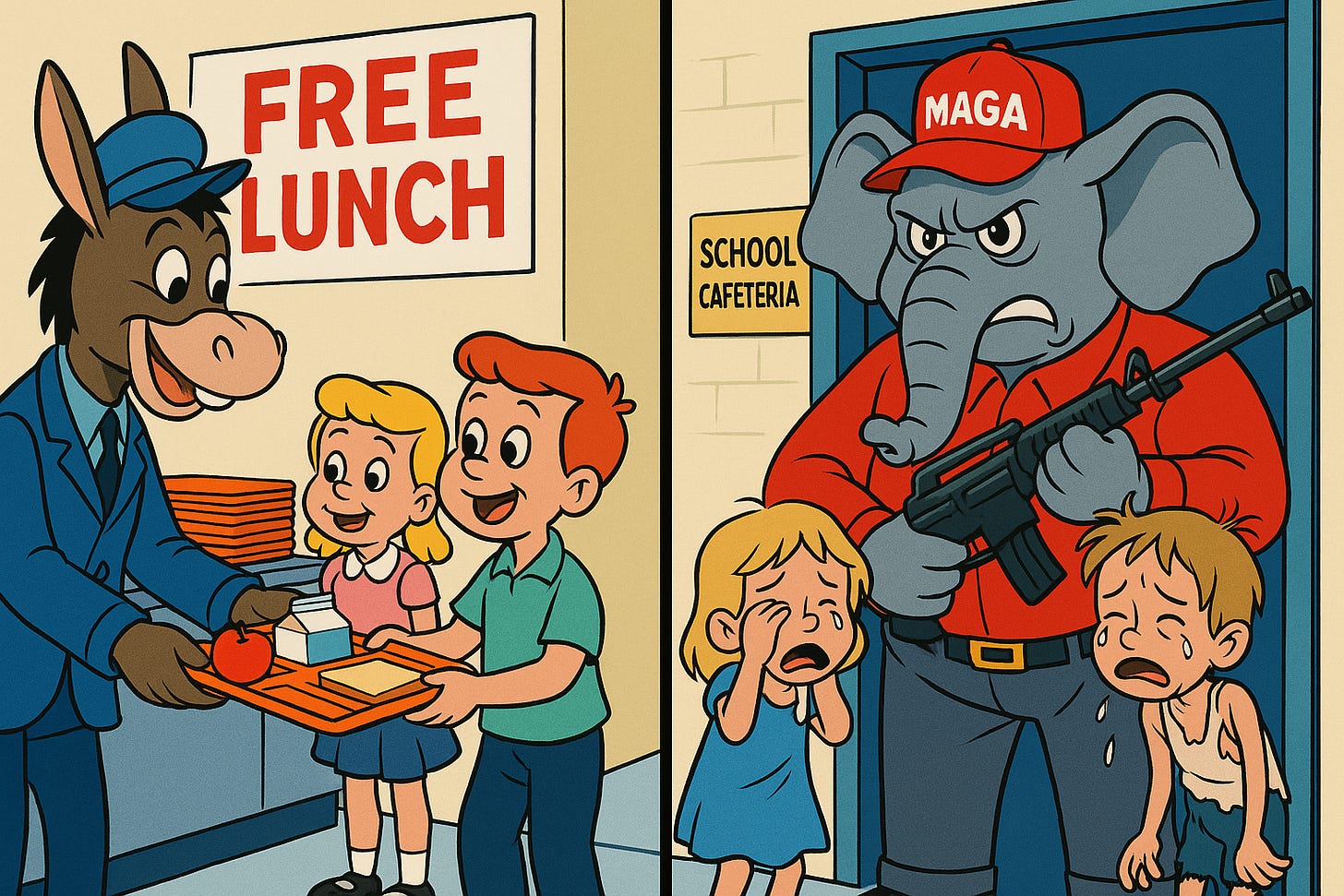Number Six
Chief Exit Officer (CEO)

There is a simple test for a government’s basic decency. Do they feed children. Massachusetts and Minnesota answered in the only language that matters at eight in the morning. They turned the lights on in the cafeteria, fired up the griddle, and took the price off the tray. No mystical budget trick. No sermon about character through hunger. They used the federal programmes that already exist, put up the state share with adult calm, and told every child to eat. The result is not flashy, which is why it works. Stomachs quiet. Classrooms steadier. A small mercy that multiplies across an entire school day.“When I give food to the poor, they call me a saint. When I ask why the poor have no food, they call me a communist.”
Dom Hélder Câmara

The Politics of Starving Children and the Cruelty MAGA Calls Virtue
“When I give food to the poor, they call me a saint.
Massachusetts made universal meals permanent. Minnesota did the same through a clear statute. The model is so plain that even the most cynical committee chair can follow it. Keep schools in the federal National School Lunch and Breakfast systems, then cover the remainder with state funds so every pupil gets one breakfast and one lunch without charge. Accountability stays. Nutrition standards stay. The difference is that a cashier no longer acts as a gatekeeper to childhood. A child does not need to disclose the family ledger to a stranger in order to eat.
Call it what it is. Common sense with a spine. A universal benefit that uses federal money first and state money next, all to wipe out the small, stupid indignities that means testing creates when you shove it into a cafeteria. The principal does not have to threaten parents over lunch debt. The teacher does not fork over more of her own pay at the end of the month. The kid with the quiet eyes does not rehearse a lie about not feeling hungry while watching a friend unwrap a sandwich. There is a reason the research keeps pointing in the same direction. Feed students and you see better attendance, calmer rooms, fewer health visits, and a climate that feels less like a census drill and more like a school.
So why would anyone oppose this. Why would a movement that shouts family values try to rip food away from children during the school day. The polite explanations arrive first because politeness is a habit even when it has outlived its use.
Cost.
Fraud.
Dependence.
But the state models already answer those. Costs are counted in the budget with the federal share right there in black and white. Oversight exists through the same federal reporting that has been in place for years. Dependence is a nonsense word in this context because the children are already required by law to be in school and food is part of making that day possible. When you strip away the flimsy talk, you are left with something raw and ugly. Ideology that prefers punishment to policy. A taste for visible suffering dressed up as fiscal virtue.
Let us be absolutely clear about the conservative project here. It is not a disagreement over packaging or procurement. It is not a quarrel about which bean should go into the chilli recipe. It is a sustained effort to keep the lunch line as a moral checkpoint. To make the poor show their papers in front of their peers. To defend a world where the tray itself becomes a status marker. You can hear it in the bored cruelty of the talking point about rich kids getting free meals, as if twelve year olds with trust funds are pillaging the budget through cartons of milk. The claim is a joke and the punchline is children. The real effect of universal meals is that the rich child and the poor child take the same tray, sit at the same table, and for twenty quiet minutes resemble equals. That equality enrages the part of conservative politics that needs the line between the deserving and the undeserving to stay bright and loud.
Hatred sits under the rhetoric like a live wire. Yes, hatred. Not the chest beating version. The desk job version. The memo that says eliminate the provision that lets high poverty schools feed everyone without paperwork. The budget draft that tries to bar the back door to universal meals. The press release that pretends this is about efficiency while it sharpens the knife for the most vulnerable students. This is how contempt looks when it learns to wear a tie. It tells a child to prove poverty before the apple is theirs. It tells a school that the real priority is policing eligibility rather than feeding the pupils they are legally bound to teach.
Ignorance plays its part too, and it struts as confidence. The insistence that targeted aid is enough, from people who have never watched a parent forget a form, or seen a family fall apart mid year, or understood what a cashier’s pause can do to a child’s face. The paperwork logic fails in real life. People miss deadlines. Languages and immigration status complicate disclosure. Pride gets in the way. Shame gets in the way. Universal access is not some soft idea dreamed up in a seminar. It is a hard, clean solution to a daily administrative failure that punishes children for adult problems.
And greed. Always the greed. The same voices that cheer tax cuts for those already comfortable suddenly become stern bookkeepers when the expenditure puts protein on a tray for a nine year old. They clutch their pearls about waste while ignoring the pure waste of hungry minds drifting through a morning lesson. They demand to know how we will pay for breakfast, then vote for giveaways that dwarf the price of feeding every child in the state. They posture as serious guardians of the purse while schools pass collection jars to erase lunch debt that never should have existed in the first place. It is a theatre of stinginess that collapses the moment you compare it to reality. Hungry students cost more. They cost time, attention, behavioural stability, and long term outcomes. Feeding them is the cheap part. Refusing to feed them is the expensive vanity.
To voters who keep sending these people back to office, let us talk without winks. What do you enjoy about this. Is it the smaller kids who run slower in gym. The teacher who pays a stranger’s debt and cries in her car. The child who learns to pretend she is not hungry because it is less humiliating than hearing no. If you back politicians who try to kill universal meals, and you do it while enjoying the show of toughness, then you are not a bystander. You are part of the machinery that starves children by design. You are voting for hunger as a character lesson. That is not conservative in any noble sense. It is petty and it is cruel.
There is a tired dodge that pops up whenever someone calls this cruelty by its name. The claim is that universal meals help people who do not need help. That is meant to sound like fairness. It is not. It is a tell. What you truly object to is a policy that stops sorting children into branded categories at the point of service. What you resent is that your own child will eat alongside a classmate who could not have afforded lunch yesterday. You prefer a world where trays carry price tags and price tags carry stigma. Say that out loud if you believe it. Own the ugliness rather than hiding behind balance sheet theatre.
Massachusetts and Minnesota show how effortlessly a serious state can break that ugliness. Keep the federal programme. Add the state share. Protect standards. Serve the food. Then you do something beautiful and practical at the same time. You remove debt and humiliation from the school day. You respect the cafeteria workers by letting them feed pupils rather than act as auditors. You allow the work of teaching to resume with fewer interruptions from an empty body that cannot focus. You trade a small appropriation for a thousand quiet improvements that compound into actual learning.
The conservative response to that evidence has been to dig in. Block the universal option where possible. Spread panic about fraud that never seems to materialise. Keep the rhetoric hot and the cafeteria cold. It is not an accident that the targets always include the rule that lets high poverty schools just feed everyone. That rule is efficient and it protects dignity. It also denies certain politicians their favourite spectacle. The spectacle of the poor made visible and accountable at a window. When that spectacle disappears, their worldview gets lonelier. So they try to restore it.
There is an honest question here for anyone still wobbling. What is the purpose of school. If your answer has anything to do with learning, then admit the plain truth. A hungry child cannot learn at the level of a fed child. A shamed child cannot learn at the level of a calm child. A classroom that doubles as a welfare checkpoint cannot function at the level of a classroom that simply teaches. Universal meals remove the distraction and the shame. They do not create utopia. They create a baseline. Food in stomachs. Attention on lessons. It is the sort of boring competence that an adult society should be able to deliver without a fight.
The fight persists because the ideology in question needs the suffering to continue. It needs the theatre of discipline. It needs the false comfort that poverty is always a personal failure that must be seen and sorted and punished. Universal school meals violate that script. They say that children are not props for moral instruction. They say that the state has a direct duty to the young that does not depend on a parent’s paperwork. They say that equality at a lunch table is not a scandal but a civic good.
So here is the invitation. Look at Massachusetts. Look at Minnesota. Nothing catastrophic happened. The sky did not fall. Schools did not go soft. What fell away were debt letters and cafeteria shaming rituals. What rose were meal counts and attention spans. You can have this in your state. The template is public and tested. The money is there. The law is there. All that is missing is the will to stop indulging the cruel fantasy that hunger builds stronger children.
If you are a lawmaker, choose adulthood. If you are a voter, stop pretending that starving a child is a clever incentive. It is not grit. It is not discipline. It is cowardice. Feed the children. Teach the children. Repeat. And if a politician wants to stand between a child and a meal, tell them to move or be voted out.



